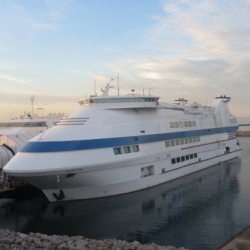The city leaders of Gary, Indiana want to turn Buffington Harbor into a transportation hub, but local gaming operators say the move would hurt Indiana’s casino industry. Caesars Entertainment, which owns one of the Gary’s casinos, said the decision would caues gaming operators like itself to reconsider investing in the state’s economy.
In October, the Indiana General Assembly’s Interim Study Committee on Commerce and Economic Development endorsed the Buffington Harbor plan. With a key committee recommending the plan, its chances of becoming a reality increased dramatically.
Not casino companies in the state are protesting the plan. Even though some are not affected directly, they argue that such a move would undermine the industry in general — because the business climate no longer would be predictable.
If the Buffington Harbor project goes ahead as the leader’s plan, it would force Majestic Star Casino to transfer one of its gaming licenses to another community. Horseshoe Casino Sr. Vice President and General Manager Dan Nita said a forced move by Majestic Star would have a chilling effect on other casinos in the state.
Dan Nita on Buffington Harbor Decision
An unannounced move would disrupt the gaming business model. For years, Indiana has maintained a balance between gaming companies and the communities where they are based.
According to Dan Nita, a forced removal would break the trust established with companies over the years. Unable to predict the business environment in the short and long term, companies would stop investing in Indiana.
Nita said, “We operate with a very defined set of ground rules. This gives all the operators a sense of security, knowing the goal line won’t be moving.”
Caesars Entertainment Might Stop Investment
The executive for Horseshoe, whose parent company is Caesars Entertainment out of Las Vegas, used a recent $1.7 billion investment by Caesars in Indiana’s gaming industry. Nita mentioned that Caesars just bought two Indiana racetrack-casinos and is building an $85 million Horseshoe Southern Indiana property on the banks of the Ohio River.
Nita said if casinos are forced to move inland to new communities, it would put future investments into question. Such a move undercuts money spent investing in developments, which companies see as wasted cash. Businessmen depend on stability and information to make sound business decisions. Such instability leads to uncertainty, which drives investors away.
Dan Nita added, “The threat of licenses being moved — it’s a domino effect. You don’t know where it will stop.”
It it the classic argument business leaders make when lawmakers start changing the business climate. They say government isn’t the solution; it’s the problem. What is interesting is that riverboat and lakeside casino operators lobbied the Indiana state legislature for the right to build land-based casinos.
Does Majestic Star Want to Move?
For instance, Majestic Star Casino’s management seemed to be excited about moving their casino from Lake Michigan to a brick-and-mortar site. Barry Cregan, Majestic Star’s SVP and manager, said of the plan, “We will determine which of the potential sites within our campus footprint can physically support the future construction, deliver the best guest experience, and provide the greatest return on investment.”
Barry Cregan and his bosses wanted the right to remove their casino from its moorings and build a larger, 21st century-style land casino. Casinos on boats do not have as much gaming space, so their table games and slots allotment is limited. Even more important, they cannot build the kind of live concert halls and convention centers that attract non-gaming revenue. A land-based casino is simply a more lucrative business.
Despite Majestic Star’s willingness to move, Caesars Entertainment insists the new rules hurt the business environment, instead of helping it. The new Majestic Star Casino likely will be a bigger competitor for Caesars’ various casino operations in the state.

